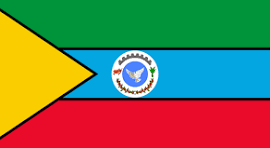THIS VERSION IS A DRAFT AND HAS NOT BEEN OFFICIALLY APPROVED
GOV2 : Monitoring and Evaluation
1. Objectives of the Procedure
The objective of this procedure is to define the modalities and processes for the PROCEED program for the Monitoring & Evaluation. It englobes four key elements: monitoring, evaluation, capitalisation (knowledge consolidation) and annual reporting. It also presents the role of the Technical Assistance regarding Monitoring & Evaluation.
2. Process for each component of the M&E
a. Monitoring
Objective: ensure continuous monitoring of the activities through systematic data collection, supporting evidence-based decision-making and transparent management.
Process:
- Data collection will be conducted at all levels, from Kebele to Regional levels, in order to facilitate effective and appropriate decision-making, transparent investment allocation, adaptation of activities to the context and needs.
- Dashboards will be used to track activities’ progress. The principles of the different indicators, milestones and the scoring systems used in each technical process is described in the procedures WS-M1 and SWC– A14. Precise dashboards and scoring mechanisms are developed in Implementing Documents.
Outputs:
- Dashboards for monitoring at Kebele, Woreda, Zone and Regional levels.
- Evidences of performance and results stored in relevant databases.
Outcomes:
- Transparent management of activities, human resources and allocation of resources for investments.
- Adaptive management of daily activities based on real-time data.
- Enhanced evidence-based decision-making by Task Forces and Steering Committees.
b. Evaluation
Objective: To assess the effectiveness and the impact of the program through periodic internal and external evaluations.
Process:
- Evaluations will be carried out periodically to assess the program progress and impact, with a particular focus on three key moments:
- Base-line: design of the continuous evaluation framework, definition of baseline data.
- Mid-term: verification of the capacity of the Local Institutions to implement the PROCEED program, verification of the implementation of the Sustainability Framework (Annex Annex GOV3 – A1), identification of signs of change.
- Final: evaluation of the capacity to integrate the lessons learned into regional policy, assessment of the implementation of the Sustainability Framework, and evaluation of observed changes.
- With the support of the Technical Assistance, the Steering Committees, at the different level, will play an essential role in designing the process, reviewing progress, identifying challenges, and adjusting the program’s strategies.
- An Observatory, under the management of the Technical Assistance (see below), will support the evaluation process through surveys, data analysis, and methodological guidance.
- External expertise will be involved as necessary to ensure an objective and impartial evaluation.
Outputs:
- Periodic evaluation reports (including mid-term and final).
- Evidence-based recommendations for program improvement.
- Lessons learned to guide future initiatives.
Outcomes:
- Improved accountability and strategic decision-making.
- Strengthened program effectiveness and long-term impact.
- Enhanced capacity of stakeholders through data-driven evaluation processes.
c. Capitalisation (knowledge consolidation)
Objective: to capture and document lessons learned and best practices in order to continuously refine the program, assess signs of change towards expected objectives, and develop knowledge and recommendations to inform regional decision and policy makers, but also to improve the implementation of on-the-ground activities (learn and apply).
Process:
- An Observatory, supported by the Technical Assistance team and periodic external evaluations, will help the program stakeholders extract key lessons from experiences developed throughout the PROCEED program. This will be achieved through:
- Continuous data collection, management, and documentation of best practices and lessons learned.
- Experience sharing among stakeholders to foster collective learning.
- Evaluation mechanisms incorporating feedback loops based on documented experiences and identified lessons.
- With the support of the Technical Assistance, the Steering Committees will ensure that these lessons drawn are systematically documented and considered in building a reference framework for their respective areas.
Outputs:
- Documentation of knowledge and best practices.
- Strategic guidance for program improvement.
Outcomes:
- Strengthened long-term impact and policy integration.
- Increased knowledge sharing and learning among stakeholders, both within and beyond the targeted Regions.
d. Annual reporting
Objective: to ensure compliance with the annual financial and technical reporting requirements between the Ethiopian Government and the AFD.
Process:
- The RTF coordinator, supported by the Technical Assistance, will prepare the annual results and reports for each sector (agriculture and water) and Region, using the regional dashboard (see Annexe WS-M1 and SWC– A14).
- Reports must be reviewed and approved by the Regional Technical Steering Committee before submission to AFD.
- The technical report will include key program and sustainability indicators, as defined in the Annexe Annex GOV2 – A1, produced with the support of the Technical Assistance.
- Financial reporting will be carried out in compliance with the processes outlined in the Financial Procedures.
Outputs:
- Regional dashboards and annual technical reports.
- Program and sustainability indicators as specified in the Annexe Annex GOV2 – A1.
Outcomes:
- Compliance with reporting obligations.
- Transparency in financial and technical management.
- Clear communication of progress and challenges to all stakeholders.
3. Role of the Technical Assistance in the Monitoring and Evaluation processes
The Technical Assistance provided by ARIA will support the implementation of the monitoring, evaluation, and capitalisation processes, as well as annual reporting. ARIA’s role will focus on:
- Ensuring that all stakeholders in the program are actively involved in continuous capitalisation and evaluation activities through reflective workshops, data collection, and dissemination efforts, with the Technical Assistance being responsible for designing the framework and facilitating the process.
- Assisting in the development of monitoring systems, provide guidance on the use of data for decision-making, and ensure that the necessary tools are in place for effective monitoring at all levels.
- Strengthening the capacity of Local Institutions by providing coaching and on-site training, workshops, and ongoing support in monitoring, evaluation, and sustainability frameworks.
- Supporting evaluation processes by establishing and managing an Observatory, by designing surveys – either self-initiated or commissioned by the RTF or Steering Committees – conducting data analysis, including the use of socio-economic typologies, and ensuring the integration of lessons learned into program strategies
- Mobilising external expertise to support continuous formative evaluation mechanisms, including designing the Terms of Reference and managing the recruitment process of this external expertise.
- Overseeing the documentation of lessons learned and best practices, ensuring that they are shared with the stakeholders and incorporated into future program activities.
- Assisting in the preparation of the annual reports by providing technical support for data collection, analysis, and reporting.
- Facilitating the integration of findings into strategic planning and decision-making processes, with special attention given to the dissemination of lessons learned (for instance through publications, events, and conferences…)

